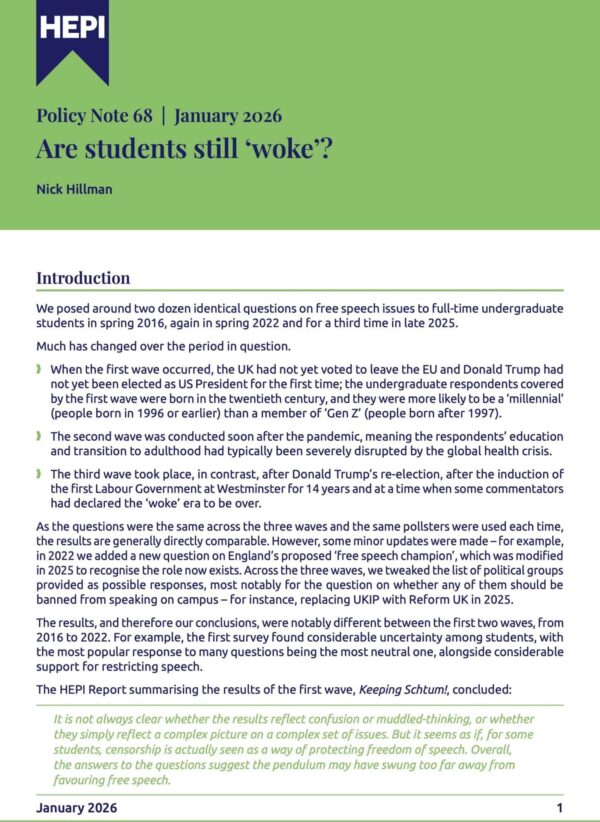Joining The Dots: Skills, regeneration, funding systems and Barrow-in-Furness.
This HEPI blog was kindly authored by Professor Julie Mennell, Vice-Chancellor of the University of Cumbria, and Martin Williams, Chair of the University of Cumbria.
Barrow-in-Furness, now in the county of Westmorland and Furness, exemplifies the Government’s approach to stimulating regeneration and growth. Considerable public money is being committed, and the University of Cumbria, as the local university, is deeply involved. We are proud of what we and others are trying to do and confidently expect that many benefits will result. But our involvement also reminds us how national systems, such as student financial support, cannot currently flex to support a nationally-mandated priority – and makes us wonder whether it is time for a little experimentation.
The Government’s reasons for focusing on Barrow are clear. Undoubtedly the town is in need of regeneration; its current health and education outcomes make depressing reading. However, Barrow is also the only place in the country where BAE Systems manufactures the nuclear-powered submarines, which are crucial to Britain’s national and global defence strategy. With a volatile international situation, these craft are in demand, and the order books at the Barrow shipyard are full for decades to come. Constructing nuclear submarines is a highly technical, labour-intensive business, and the company and its suppliers urgently need to grow and upskill their workforces. However, the local Furness population is ageing, and for decades, employers there have struggled to attract and retain skilled workers. To grow, Barrow has to improve its ‘liveability’ – in other words, a big regeneration effort.
Because the submarine programme is a national priority, Government has been prepared to intervene directly to support this goal. It has invested £220 million, coordinated by a Board chaired by a former Cabinet Secretary. Their recently published 10 Year Plan recognises the interconnectedness of what needs to happen, covering health, transport, education, skills, housing, environment and leisure. It is ambitious, but not unrealistic, given the underpinning demand from a large, profitable company and its associated supply chains. The Government’s recent Defence Industrial Strategy document quotes Team Barrow as a model on which to build.
The University of Cumbria has been deeply involved in the development of this Plan. We sit on the Team Barrow Delivery Board and will contribute to everything the Plan seeks to achieve. We are already BAE Systems’ main supplier of project managers, via degree apprenticeships. We train the nurses and healthcare workers that the town will need, and from this year, our new Medical School means we can provide a wider range of practitioners. We can produce the teachers to improve the schools, and the artists and environmental scientists to enhance Furness’s natural and cultural landscapes.
We can and will do more. This month the University opens a new campus, supported by Town Deal money, right next to the shipyard on Barrow Island. With BAE Systems, we are now creating new courses based there in mechanical engineering and computer science. There will be a new Doctoral Training Centre and Innovation Hub to develop and test potentially viable new products and processes and to attract more PhD-level skills into Furness. There is potential for even closer working with the local FE Colleges. We are investing, and we want to invest, and the public purse is supporting that investment.
But this is the supply side. Will it be enough to attract students and researchers at the speed and in the numbers that are wanted?
In a demand-led higher education system, this is primarily a matter for universities. We have to convince students to enrol. If they don’t come, our income will be directly affected. The onus is on us to sell our offerings, and on potential employers to give extra support to students if they think that is worthwhile.
Fair enough, but should that be the whole story in this case? The courses are being created in response to a Government goal. The faster the recruitment to these courses, the quicker the effect on the supply of local skills. We know there are barriers to overcome. It isn’t accidental that Barrow is currently a higher education cold spot. A lot of Barrovians come from families that believe university courses are not for them. BAE Systems are offering generous scholarships and paid placements for local students, but mindsets don’t change quickly. And how many people from outside the region will instinctively encourage their children or friends to consider a course in Barrow in Furness, offered by the University of Cumbria? Barrow is a remote and superficially not very attractive town. The University of Cumbria isn’t in ‘the Russell Group’. A new course, by definition, won’t appear in the Times league tables and won’t yet have employment outcomes (although as a university, we rank top in Northwest England on this measure). We believe they will be good quality courses, offering excellent prospects in the jobs market, but it will take time to establish their reputation.
The whole rationale behind the Barrow Rising programme is that Government intervention is needed if Barrow is to become what the country needs it to be. However, the Government’s Higher Education funding system offers no incentives for students to overcome their possible preconceptions. There is a ‘level playing field’ of student choice; any course, anywhere, attracts the same support. 12 years of this model has demonstrated its results. Students tend to play safe and favour longer-established, higher-prestige institutions. A perfectly sensible approach for them to take. But might the public interest right now be better served by a playing field that could be tilted slightly in favour of, for example, engineering courses in Barrow?
Fiddling with funding systems is tricky and prone to unintended consequences. Nevertheless, Barrow is a small place, of particular interest to Government and facing some particular challenges. It would surely be useful to the Government to know whether targeted financial incentives, nudging students towards strategically important courses in particular places, made a difference to behaviours. If successful, the approach could be applied to a few other selected priority areas or courses.
This would be a new step, but this Government has signalled it wants to think imaginatively in support of growth. With a higher education policy document expected in the autumn, is there space to experiment with a more strategic use of a tiny piece of the huge student finance budget?







Comments
Add comment